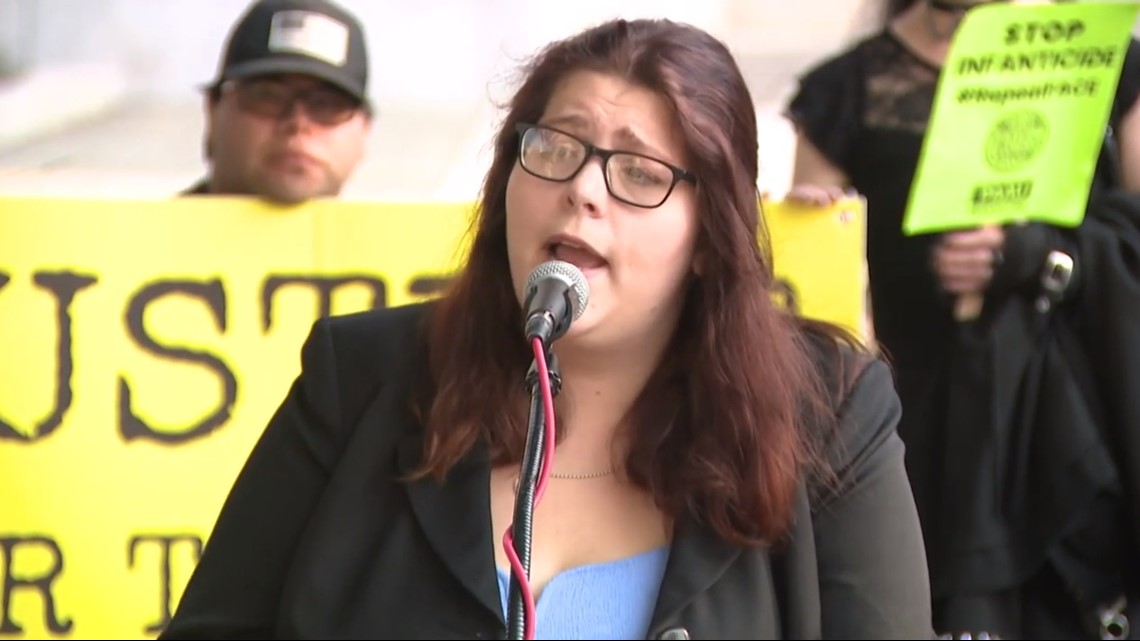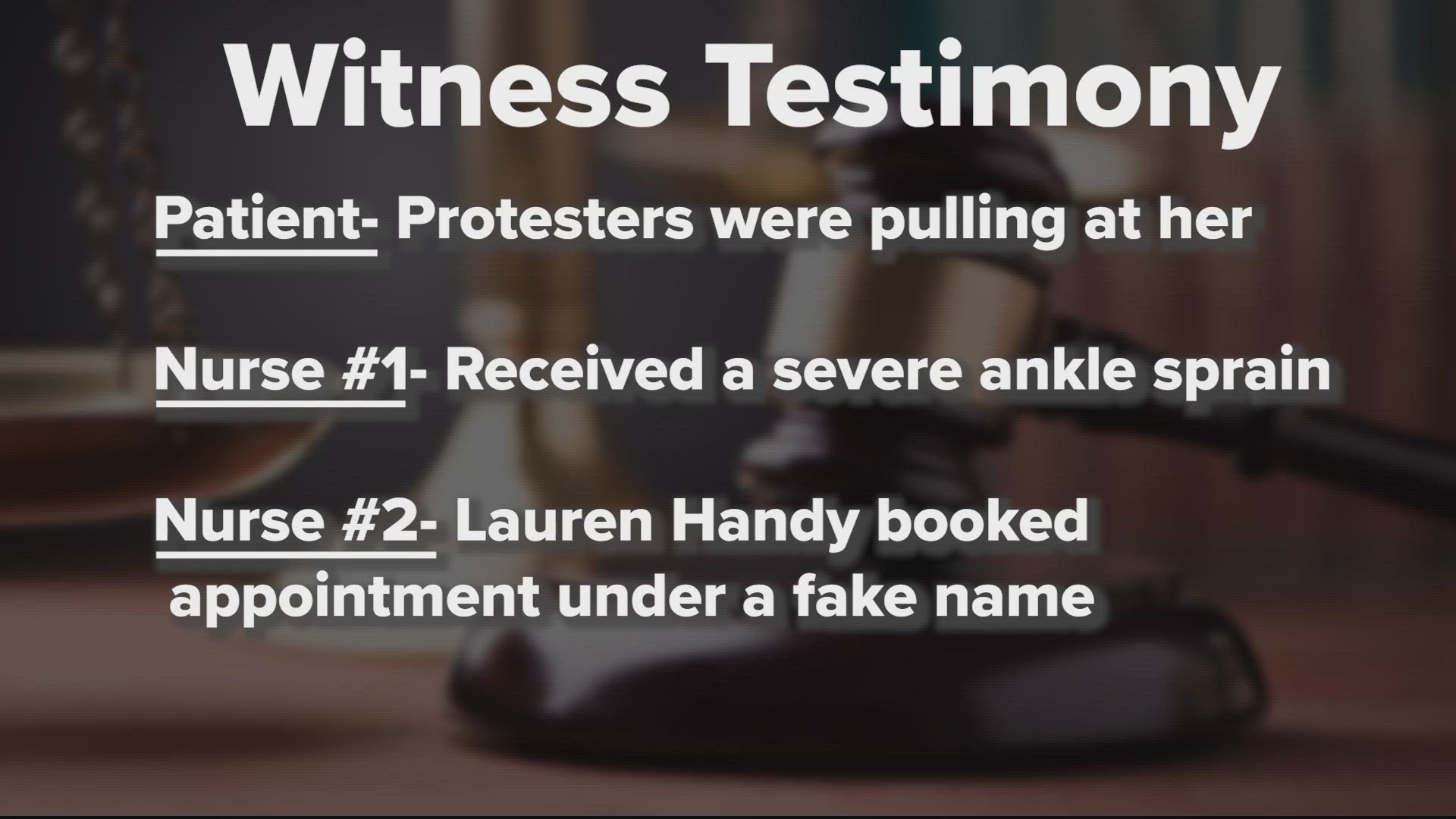WASHINGTON — A federal judge warned a woman dressed as a nun not to attempt to influence a witness Monday as the government closed its case against a group of anti-abortion activists accused of conspiring to blockade a D.C. clinic.
The trial, which began last week, has drawn an unusually full gallery of spectators and supporters each day as federal prosecutors presented evidence that activists Lauren Handy, Heather Idoni, Herb Geraghty, William Goodman, John Hinshaw and others plotted to block entrance to the Washington Surgi-Clinic on Oct. 22, 2020. All five defendants face two potential felony charges of violating the Freedom of Access to Clinic Entrances (FACE) Act and conspiracy against rights. A second group of defendants is scheduled to begin trial on the same charges next month.
Federal trials without high-profile defendants rarely draw large audiences and even more rarely involve a judge addressing members of the public gallery directly. However, on several occasions U.S. District Judge Colleen Kollar-Kotelly admonished members of the gallery not to attempt to speak with jurors or witnesses. The admonishments began on the first day of jury selection, when a group of supporters was handing out pamphlets to people entering the courthouse attacking the charges and the judge. Kollar-Kotelly warned from the bench that protesters had the right to hold signs and demonstrate outside the courthouse, but that handing materials that discussed the case to potential jurors could be construed as jury tampering.


Last week, Kollar-Kotelly was forced to briefly pause the trial and hold a sealed bench conference after someone in the public gallery yelled, “I love you Caroline!” at a government witness, anti-abortion activist Caroline Davis, after court broke for the day but before her testimony was finished. On Monday, Kollar-Kotelly again had to admonish a member of the public gallery, a woman dressed as a nun, after she learned she’d been making the sign of the cross toward a witness while she was on the stand and had approached her and begun saying the Hail Mary to her face in a hallway during a break in testimony.
In an order Monday morning, Kollar-Kotelly also placed all transcripts from jury selection under seal until further notice “in light of certain issues with witness tampering” she had discussed with attorneys during the sealed hearing last week.
Despite the interruptions, federal prosecutors rested their case sooner than expected Monday after three days of testimony. Assistant U.S. Attorneys Sanjay Patel and John Crabb have sought to convince jurors the group of activists, led by Handy, were not just aware their plan to blockade the clinic was illegal but also discussed the specific statute under which they could be charged. To show that, they relied heavily on Davis, a 24-year-old who traveled to D.C. with Idoni and was stationed in an elevator during the clinic blockade.
Davis, who testified under a cooperation agreement as part of a separate but unrelated clinic blockade case in Michigan, said she participated in a meeting with other activists the night before the blockade. During the meeting, she said, Handy laid out the plan in detail – including the layout of the clinic – and described the possible charges participants who blocked entrances could face.
“She talked about how you might be arrested,” Davis said. “She talked about how you could be arrested for trespassing, but also on FACE charges.”
Davis said members of the group discussed using locks and chains to blockade the clinic – which several ultimately did – although Handy did not lead that part of the discussion. Under questioning from Patel, she also said she believed everyone involved was in agreement about trying to block the clinic from providing services to patients.
“There was no disagreement about that whatsoever,” Davis said. “They were all on the same page.”
Two patients who had appointments scheduled the day of the blockade testified under pseudonyms last week. One, a 27-year-old woman from Pennsylvania, said the activists grabbed at and harassed her until she was nearly hysterical with distress. She ultimately climbed through a window to evade them. Another patient, an Ohio woman, said she had come to the Surgi-Clinic because of a fetal abnormality that was likely incompatible with life. She testified that she collapsed in pain on the floor while activists blocked her from entering and yelled at her and her husband.
Bolstering the government’s case were the defendants’ own words, including a body-worn camera video showing Handy – using her middle name, Bryce – telling police why she and her group were at the clinic that day.
“Today we are doing a rescue,” Handy says on the video. “We are basically blocking the facility to prevent abortions today."
Jurors also saw another defendant in the second group, Jonathan Darnell, livestreaming from the clinic and explaining that the strategy being used by the activists – known as a “lock and block” – hadn’t been used in more than two decades since the FACE Act was signed by former President Bill Clinton in 1994.
“For only the third time in 25 years, pro-lifers are physically blocking the doors of an abortion clinic,” Darnell said on the Facebook Live stream. “This is very risky for the rescuers.”
Leading up to the blockade, Handy and Geraghty also discussed how many people would attend and, of those, which would risk being arrested. In a Facebook message entered as evidence, Handy told Geraghty she though the blockade was “going to be huge – something we haven’t seen for 25 years.”
“So far 14 people are risking arrest and five people are leaving when the cops come,” Handy wrote in another message.
All of the defendants have denied wrongdoing and have argued, among other things, that the case would have been more appropriately charged under a local trespassing statute and that it should be dismissed in the wake of the Supreme Court’s landmark decision in Dobbs v. Jackson Women’s Health Organization overturning the constitutional right to an abortion established in Roe v. Wade. Four of the defendants – Handy, Idoni, Goodman and Geraghty – were expected to take the stand and testify on their own behalf. In an order before trial, Kollar-Kotelly limited what they can tell the jury, including barring them from arguing their actions were necessary or in defense of another person. The judge ended the day early Monday to allow her more time to consider whether to admit a 2012 undercover video of the Surgi-Clinic’s medical director Handy claims was instrumental in her decision to become an anti-abortion activist.

